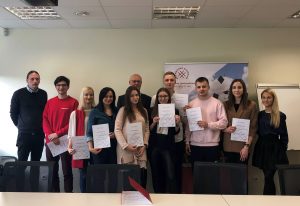
Today the community of Kazimieras Simonavičius University congratulated the students for the most advanced achievements. KSU Rector Prof. Dr. Arūnas Augustinaitis, Director of the Study Department Ieva Nadvaravičiūtė, Director of the Business School Deimantė Žilinskienė and Director of Institute of Creative Society and Economics Dr. Mindaugas Kazlauskas awarded the students with study grants to pay for the upcoming semester.
Last semester excellent results were achieved by 1st year students of Aviation Management Simas Linkevičius and Ana Marija Sokolovskaitė, Entrepreneurship and Management student Nikita Mudrak, Fashion Industry student Miglė Bivainytė, Entertainment and Tourism Industry student Jekaterina Smagina, 2nd year Marketing and Advertising student Erik Miliuškevič, 3rd year Aviation Management student Marta Kovalchuck, Law student Liudmila Legkova and Fashion Industry student Gloria Šamsutdinova.
Very good results were achieved by 1st year students of Aviation Management Emilia Koščic and Donata Navelskytė, and 2nd year students of Fashion Industry Laura Naidzinavičiūtė and Simona Vysockaja.
 An important day for the University! Chancellor of Kazimieras Simonavicius University Darius Verbyla and Director of the Business School Deimante Žilinskienė yesterday visited Berlin, Germany, where they met with the Rector of the University of Applied Sciences Europe (UE) & CEO and Group Rector of the one of the world’s largest education group, Global University Systems (GUS) Prof. Dr. Maurits Van Rooijen. During the meeting, a cooperation agreement was signed for the implementation of KSU and UE Double Degree Studies in the KSU Business School’s Entrepreneurship and Management and Business Management Bachelor study programs.
An important day for the University! Chancellor of Kazimieras Simonavicius University Darius Verbyla and Director of the Business School Deimante Žilinskienė yesterday visited Berlin, Germany, where they met with the Rector of the University of Applied Sciences Europe (UE) & CEO and Group Rector of the one of the world’s largest education group, Global University Systems (GUS) Prof. Dr. Maurits Van Rooijen. During the meeting, a cooperation agreement was signed for the implementation of KSU and UE Double Degree Studies in the KSU Business School’s Entrepreneurship and Management and Business Management Bachelor study programs.
Dual degree studies with UE, part of the GUS International Network of Higher Education Institutions, will offer KSU students a unique opportunity to spend part of their studies in one of the three UE campus in Berlin, Hamburg or Iserlohn, as well as to undertake internships in business organisations in Germany and to obtain KSU and UE bachelor’s degrees.
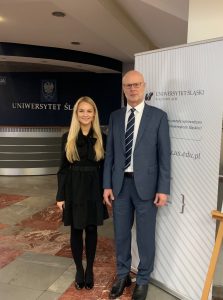 KSU Rector prof. dr. Arūnas Augustinaitis and Director of the Business School Deimantė Žilinskienė had a meeting with partners of the project (universities of Poland, Cyprus and Malta) and disscussed about the possibilities of improving students and teachers communication skills, learning competences by using state-of-the-art and digital methods. The meeting was held on the 28th-29th of November, in Katowice, Poland.
KSU Rector prof. dr. Arūnas Augustinaitis and Director of the Business School Deimantė Žilinskienė had a meeting with partners of the project (universities of Poland, Cyprus and Malta) and disscussed about the possibilities of improving students and teachers communication skills, learning competences by using state-of-the-art and digital methods. The meeting was held on the 28th-29th of November, in Katowice, Poland.

Kazimieras Simonavicius university signed agreement with – GetJet Airlines.
KSU Rector prof. dr. Arūnas Augustinaitis and Director of Business School Deimantė Žilinskienė held a meeting with CEO of GetJet Airlines Darius Viltrakis and HR Director Oksana Tiuchtij. During the meeting not only cooperation agreement was signed, but they also discussed the issues of training of aviation management specialists, improvement of aviation management study program and development of competencies of people working in the aviation industry.
9 December – Lecturer Marek Świerczyński from The Cardinal Wyszynski University (Poland) will give lecture “Issues of IT Law”. Intellectual property issues in the area of IT, Artificial Intelligence and law, IT European law and other issues will be presented and discussed.
Lecture will start at 13:30 in room no. 211.

New books of Big Data have been supplemented to Kazimieras Simonavicius University library, which will be accessible to all KSU students and guests.
 Our new International Aviation lecturer Diogenis Papiomytis has joined to KSU team this semester. He heads the Commercial Aviation research and consulting practice of Frost & Sullivan, a global aviation consultancy. He is responsible for the delivery of industry research reports and strategy consulting projects, with clients coming from Airlines, Airports, Aircraft Manufacturing and Aviation Aftermarket segments. He previously worked in the Corporate Strategy department of c and as a Senior Lecturer in Aviation Studies at Buckinghamshire New University in the UK. Diogenis holds a BA (Hons) in Modern Languages and International Business, a MSc in Air Transport Management from Cranfield University and a MBA from Cass Business School at London City University.
Our new International Aviation lecturer Diogenis Papiomytis has joined to KSU team this semester. He heads the Commercial Aviation research and consulting practice of Frost & Sullivan, a global aviation consultancy. He is responsible for the delivery of industry research reports and strategy consulting projects, with clients coming from Airlines, Airports, Aircraft Manufacturing and Aviation Aftermarket segments. He previously worked in the Corporate Strategy department of c and as a Senior Lecturer in Aviation Studies at Buckinghamshire New University in the UK. Diogenis holds a BA (Hons) in Modern Languages and International Business, a MSc in Air Transport Management from Cranfield University and a MBA from Cass Business School at London City University.
Our lecturer Diogenis Papiomytis in CNBC: https://www.cnbc.com/video/2019/03/13/boeing-issue-has-brand-implications-as-well-analyst-says.html

On 10-11 October, 2019 „Platforms of Big Data Foresight (PLATBIDAFO)“ project team participated in the Workshop on Foresight Software and Algorithms in Helsinki (Finland), which was organised by Kazimieras Simonavičius University (KSU) together with Google Garage Learning Centre (Finland) and XAMK (South-Eastern Finland University of Applied Sciences).
Participants from KSU, XAMK, Helsinki Municipality, Google Garage Learning Centre and start-ups, working in the fields of big data and future foresight, discussed different aspects of big data challenges, including analytical tools, algorithms and software development. Project researchers analysed current big data issues with the representatives from Statzone and Futures Platform, who presented their services, emerging challenges and needs pertaining to big data and foresight. During the Workshop topics on data modelling and programming, qualitative data analysis with big data, big data scientific results, big data and Lithuanian Smart Specialisation Strategy and other relevant issues were discussed. Participants visited Google Garage Learning Centre in Helsinki and XAMK Campus and Google Green Data Center in Hamina.
The project “Platforms of Big Data Foresight (PLATBIDAFO)” is implemented by Big Data Excellence Centre at Kazimieras Simonavičius University and is financed by the Research Council of Lithuania. The project aims to create tools and methodologies, which will enable companies and organisations to tackle social problems by helping them to identify social exclusion, demographic change, regional development and other problems as well as spotting and predicting future trends.
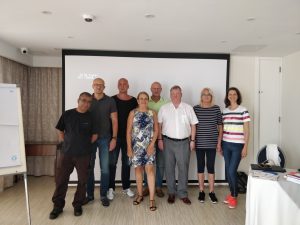
Last week (September 18-19, 2019) the research team of the project „Platforms of Big Data Foresight (PLATBIDAFO)“ took part in the workshop on Big Data Lakes and Libraries, which was organised in Malta by Kazimieras Simonavičius University (KSU) (Lithuania) together with the University of Malta and the world famous Edward de Bono Institute for the Design and Development of Thinking. The Edward De Bono Institute is known for their contribution to the fields of Future Studies, Innovation Management, Creativity and Entrepreneurship.
Participants from KSU, University of Malta, the Edward de Bono Institute and other education institutions and industry discussed challenges and possibilities of the Big Data Library development. Speakers introduced theoretical and practical approaches on the integration of foresight methods, discussed sources, combination of Big Data Lakes and other principles of Big Data Library development. During the discussions the foundations for the theoretical model of the Big Data and Foresight integration were set up.
The project “Platforms of Big Data Foresight (PLATBIDAFO)” is implemented by Big Data Excellence Centre at Kazimieras Simonavičius University and is financed by the Research Council of Lithuania. The project aims to create tools and methodologies, which will enable companies and organisations to tackle social problems by helping them to identify social exclusion, demographic change, regional development and other problems as well as spotting and predicting future trends.
PROF. DR. JARI KAIVO-OJA
UNIVERSITY OF TURKU, RESEARCH DIRECTOR OF FINLAND FUTURE RESEARCH CENTRE, RESEARCH Professor of Kazimieras SImonavicius university
Nowadays we are moving from Business Intelligence (BI) to Big Data analytics (BDA). In many fields of industries and in society, knowledge is a key strategic resource. Big Data represents a new technology and business paradigm for data that are generated at high velocity, and high volume and with high variety. Today Big Data is envisioned as a game-changer capable of revolutionizing the way businesses and societies operate in many fields. We need to understand the potential of integrated view of Big Data. The potential is surely larger than traditional data. Big Data is expanding every day. The growth of the three triangular dimensions, are negatively related to veracity, but positively related to complexity, variability, decay, and value (see Figure 1). This is fundamental reason why there are so many possibilities to create benefits and strategic advantages.
There have been Big Data available for many years (about over 20 twenty years), but only a small part of it is utilized. The first phase of Big Data 1.0 was in 1994-2004 (e-Commerce phase), second phase of Big Data 2.0 (social media phase) was in 2005-2014 and now we live Big Data 3.0 phase (IoT applications Plus BD 1.0 and Big Data 2.0). In current phase IoT applications can generate data in the form of images, audio, and video. This is a new technology environment. E-commerce websites and social media are still primary sources of Big Data, but IoT-based sensors read data from various equipment deployed for various operations. Streaming data analytics have great potential in a number of industries and financial and other welfare services, where streaming data are generated through human activities, machine data or sensor data.
Harnessing the power of Big Data is a key strategic challenge also for modern technology and digitalization roadmaps and especially for Industry 4.0 and Society 5.0 strategies.
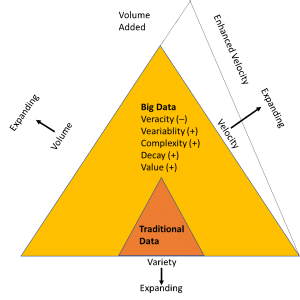
Figure 1. An integrated view of Big Data (Lee 2017).
Data science and data analytics are needed also for better foresight analyses and better future decisions. Ignorance and misunderstanding are very bad enemies of decision-makers and ordinary citizens.
There are many problems in the field of Big Data management and development. Typical problems are:
- Why we need Big Data more?
- How do we find Big Data for our analyses? How we develop clean data instead of dirty data?
- How we can develop Big Data libraries for various stakeholders and real-life needs?
- How we can create synergies between different stakeholders and organizations in the field of Big Data analytics?
- What are the key advanced methods and models of Big Data foresight?
- Do smart cities need Big Data and how they create and develop it?
- How we discover, analyze, visualize and present Big Data analyses and results?
- How to become an active player in the Big Data analytics and markets?
- How to deploy and manage a lifecycle approach to Big Data analytics and problems?
- How to find good partners and synergic networks in the field of Big Data analytics?
- How to use Big Data in business and in innovative business modeling?
- How to use Big Data in innovation management and in the Triple Helix or extended Quartet Helix environment?
- How e-business players and start-up ecosystems could get benefits from Big Data analyses?
- Which are useful and most promising matching tools to use in business and public planning?
- How public decision-makers could develop Smart Specialization Strategy on the basis of Big Data analytics?
- How we define the endgame model for Big Data analytics? Do we need system theory to find such an endgame model?
- How Lithuanian Digitalization Roadmap will be implemented with the help of the Big Data foresight approach?
- How to test Big Data apps?
There are many good questions in the field of Big Data and data analytics. The grand challenge is that the Big Data field is in fast transformation and progress. There is not one self-evident “wonder code” or “wonder model” of Big Data. What is certain that hurried managers are surely stressed with Big Data challenges. The already fast invention of Big Data foresight reveals that the reality of Big Data innovation ecosystem is complex and changing. There are various alternative Big Data sources, BD solutions, and BD models. There good open source solutions but also interesting commercial tools. There is needs to make inventions and comparative analyses. What works? How does something work? How many resources are needed? etc. There are very good questions for us. Tailoring solutions for stakeholders will not be easy task in this complex decision environment.
The project “the Platforms of Big Data Foresight” has various work packages. WP:s are:
- Desk work analyses and integration of key R&D works
- Big Data Library Development
- Open Innovation Tools and Crowdsourcing with Big Data
- E-commerce Tools with Big Data
- Matching (meeting demand and supply) Tools with Big Data
- Testing and Piloting Apps.
We know that Big Data provides great potential for firms in new businesses, developing new products and services, and implementing business models and operations. Obvious benefits can be (1) personalization marketing, (2) better pricing, (3) cost reduction, (4) improved customer service. To gain such benefits requires that the challenges of Big Data are met professionally, (1) improving data quality, (2) improving data security, (3) providing privacy and trusted information systems, (4) proving professional investment justification, (5) developing data management and Big Data libraries, (6) educating qualified data scientists and (7) improving data learning facilities in workplaces and schools.
To meet these challenges of the Big Data field, we need better organizational awareness and incentive systems to utilize Big Data in various contexts. Too many incentives lead us to ignorance and bad knowledge management in organizations
Almost needless to say, all these PBDF work packages are challenging and ambient. Our research team will work with work packages and research questions. What we can expect is accumulated know-how of Big Data management and clear high-quality deliverables to all WPs. Hopefully we can also deliver something, which goes beyond all expectations in the field of Big Data foresight research.
Jari Kaivo-oja
Research Professor, Dr, Kazimiero Simonavičiaus University, KSU
Adjunct Professor, University of Helsinki, University of Lapland
Some references
Bzhalava, Levan, Kaivo-oja, Jari & Hassan, Sohaib S. (2018) Data-based Startup Profile Analysis in the European Smart Specialization Strategy: A Text Mining Approach. European Integration Studies, No. 12, 118-128.
Bzhalava, Levan, Hassan, Sohaib S., Kaivo-oja, Jari & Köping Olsson, Bengt (2019) Mapping the Wave of Industry Digitalization by Co-word Analysis. A manuscript submitted to review process.
Chen, C. F., Qian, O., and Dai, Y. Z. (2014). Study on the Construction of Digital Library in the Age of Big Data. Library and Information Service, 58(7), 40–45.
EMC Educational Services (2015) Data Science and Big Data Analytics. Discovering, Analyzing, Visualizing and Presenting Data. John Wiley and Sons. Indianapolis, Indiana, USA.
Gandomi, Amir & Haider, Murtaza (2015) Beyond Hype: Big Data Concepts, Methods, and Analytics. International Journal of Information Management. 35, 137-144.
Hajirahimova, Makrufa, Sh. and Aliyeva, Aybeniz S. (2017). About Big Data Measurement Methodologies and Indicators. International Journal of Modern Education and Computer Science, 9 (10), 1–9.
Haukioja, Teemu, Kaipainen, Jouni, Kaivo-oja, Jari, Karppinen, Ari, Laitinen, Katja, Stenvall, Jari, Vähäsantanen, Saku (2019) Book review. Carlo Gianelle, Dimitris Kyriakou, Caroline Cohen, Marek Przeor (eds.), Implementing Smart Specialisation Strategies, A Handbook. European Spatial Research and Policy. Vol. 26, No. 1, 213-2018.
Kaivo-oja, Jari, Roth, Steffen & Westerlund, Leo (2017) Futures of Robotics. Human Work in Digital Transformation. International Journal of Technology Management. Vol.73, No. 4, 176 – 205.
Lee, In (2017) Big Data: Dimensions, Evolution, Impacts and Challenges. Business Horizons, 60, 293-303.
Oussos, Ahmed, Benjelloun, Fatima-Zahra, Laheen, Ayoub Ait & Belfkih, Samir (2018) Big Data Technologies: A Survey. Journal of King Saud University – Computer and Information Sciences. 30, 431-448.
Roth Steffen, Valentinov, Vladislav, Kaivo-oja Jari & Dana Leo-Paul (2018) Multifunctional organisation models. A systems-theoretical framework for new venture discovery and creation, Journal of Organizational Change Management, Vol. 31 No. 7, pp. 1383-1400 [SSCI 1.262, Scopus, CNRS**, CABS**]. This article won an Emerald Literati Award 2019 for Highly Commended articles and has therefore been made freely available for a period. Please click the banner to access the free version of the article or download it here once this period has expired. https://www.emerald.com/insight/content/doi/10.1108/JOCM-05-2018-0113/full/html
Roth Steffen, Schwede Peter, Valentinov Vladislav, Pérez-Valls Miguel, and Kaivo-oja, Jari (2019) Harnessing Big Data for a Multifunctional Theory of Firm. European Management Journal. © Elsevier Forthcoming. DOI: 10.1016/j.emj.2019.07.004 [SSCI 2.985, Scopus, CNRS**, CABS**, VHB***].
Smirnova, Ekaterina, Ivanescu, Andrada & Bai, Jiawei (2018) A Practical Guide to Big Data. Statistics and Probablity Letters, 136, 25-29.
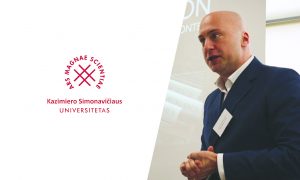
We are very proud of our research scientist proff. Dr Steffen Roth for his recent publication in ElSEVIER journal.
You can find out this article on the link given below: https://bit.ly/2NpRCKK
 This summer from July 16th until 27th Turiba University in Riga will host NORDPLUS intensive course „Security and Active Citizenship”. We invite to apply students of all faculties, especially Security and Law programmes.
This summer from July 16th until 27th Turiba University in Riga will host NORDPLUS intensive course „Security and Active Citizenship”. We invite to apply students of all faculties, especially Security and Law programmes.
In recent years security issues have become important also to Baltic and Nordic countries. World is coping such challenges as migration, conflicts based on different cultural backgrounds, cyber-attacks and other new challenges. This leads to fact that there is need for high quality training for young security specialists.
Student will gain knowledge of assessment of security tactics for guarded sites, basics of tactical planning and implementation methods for threat prevention and their legal regulation; comprehensive knowledge of facts, theory and correlations necessary for carrying out work related tasks, personal growth and development, active citizenship and social integration. There will be topics of Stress Management in Crisis Situations, Globalization and Intercultural communication, Team-building as well as Active citizenship included in the course.
In this Course participants will be bachelor and master level students from Latvia, Lithuania, Estonia and Finland. Lessons and practical seminars will be led by professors from 4 partner Universities as well as invited professionals.
Language of the Course – English, participation in the Course – free of change. Organisers will cover travel, accommodation, catering, study visits’ and free time activity costs. Students will receive 3 ECTS for the participation in the Course.
Please fill application form and send it to interntional@ksu.lt until 17 June. Only 6 students from KSU will get chance to participate in this course.
Feedback and video about the previous Courses can be found here.
This Course is implemented by Turiba University (Latvia) in a cooperation with Kazimieras Simonavičius University (Lithuania), Tallinn University of Technology (Estonia) and Turku School of Economics (Finland). Project receives financial support from NORDPLUS Higher education program. Project number: NPHE-2019/10177.

 An important day for the University! Chancellor of Kazimieras Simonavicius University Darius Verbyla and Director of the Business School Deimante Žilinskienė yesterday visited Berlin, Germany, where they met with the Rector of the University of Applied Sciences Europe (UE) & CEO and Group Rector of the one of the world’s largest education group, Global University Systems (GUS) Prof. Dr. Maurits Van Rooijen. During the meeting, a cooperation agreement was signed for the implementation of KSU and UE Double Degree Studies in the KSU Business School’s Entrepreneurship and Management and Business Management Bachelor study programs.
An important day for the University! Chancellor of Kazimieras Simonavicius University Darius Verbyla and Director of the Business School Deimante Žilinskienė yesterday visited Berlin, Germany, where they met with the Rector of the University of Applied Sciences Europe (UE) & CEO and Group Rector of the one of the world’s largest education group, Global University Systems (GUS) Prof. Dr. Maurits Van Rooijen. During the meeting, a cooperation agreement was signed for the implementation of KSU and UE Double Degree Studies in the KSU Business School’s Entrepreneurship and Management and Business Management Bachelor study programs.


 KSU Rector prof. dr. Arūnas Augustinaitis and Director of the Business School Deimantė Žilinskienė had a meeting with partners of the project (universities of Poland, Cyprus and Malta) and disscussed about the possibilities of improving students and teachers communication skills, learning competences by using state-of-the-art and digital methods. The meeting was held on the 28th-29th of November, in Katowice, Poland.
KSU Rector prof. dr. Arūnas Augustinaitis and Director of the Business School Deimantė Žilinskienė had a meeting with partners of the project (universities of Poland, Cyprus and Malta) and disscussed about the possibilities of improving students and teachers communication skills, learning competences by using state-of-the-art and digital methods. The meeting was held on the 28th-29th of November, in Katowice, Poland.


 Our new International Aviation lecturer Diogenis Papiomytis has joined to KSU team this semester. He heads the Commercial Aviation research and consulting practice of Frost & Sullivan, a global aviation consultancy. He is responsible for the delivery of industry research reports and strategy consulting projects, with clients coming from Airlines, Airports, Aircraft Manufacturing and Aviation Aftermarket segments. He previously worked in the Corporate Strategy department of c and as a Senior Lecturer in Aviation Studies at Buckinghamshire New University in the UK. Diogenis holds a BA (Hons) in Modern Languages and International Business, a MSc in Air Transport Management from Cranfield University and a MBA from Cass Business School at London City University.
Our new International Aviation lecturer Diogenis Papiomytis has joined to KSU team this semester. He heads the Commercial Aviation research and consulting practice of Frost & Sullivan, a global aviation consultancy. He is responsible for the delivery of industry research reports and strategy consulting projects, with clients coming from Airlines, Airports, Aircraft Manufacturing and Aviation Aftermarket segments. He previously worked in the Corporate Strategy department of c and as a Senior Lecturer in Aviation Studies at Buckinghamshire New University in the UK. Diogenis holds a BA (Hons) in Modern Languages and International Business, a MSc in Air Transport Management from Cranfield University and a MBA from Cass Business School at London City University.



 This summer from July 16th until 27th Turiba University in Riga will host NORDPLUS intensive course „Security and Active Citizenship”. We invite to apply students of all faculties, especially Security and Law programmes.
This summer from July 16th until 27th Turiba University in Riga will host NORDPLUS intensive course „Security and Active Citizenship”. We invite to apply students of all faculties, especially Security and Law programmes.